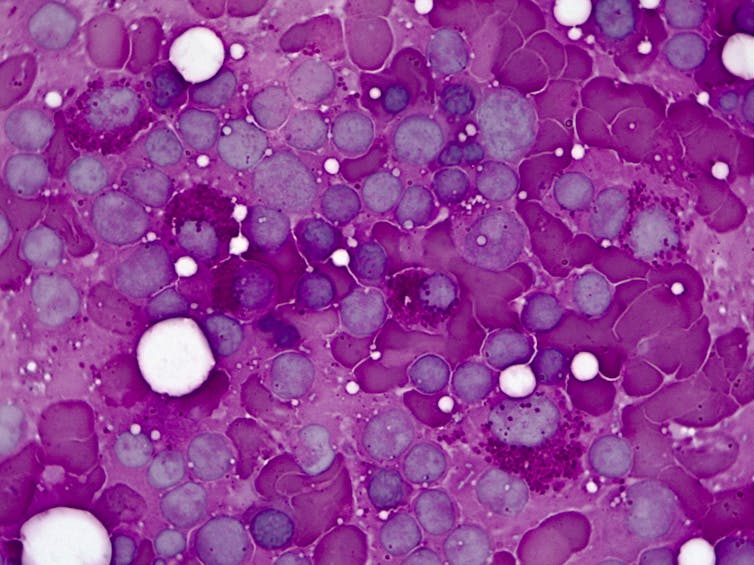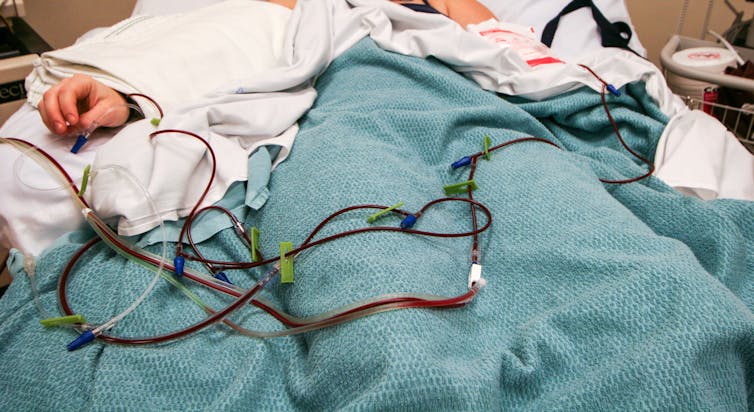
Kate Ann Markey, University of Washington
One promising treatment for patients with blood cancers is stem cell transplantation. Doctors completely eliminate the patient’s immune system by aiming chemotherapy, radiation or both at their bone marrow before replacing it with a donor’s immune system. Because the bone marrow produces blood and immune cells, completely substituting cancerous bone marrow with healthy cells could help the body reestablish a functioning immune system and replace cancerous blood cells.
This procedure is not without risks. A key complication hematologists like me worry about is graft-versus-host disease, where the donor’s immune system recognizes the patient’s body as “foreign” and launches an attack. Up to 50% of patients who receive a stem cell transplant develop graft-versus-host disease.
One unexpected part of the body that may play a key role in protecting transplant patients from complications, however, is their gut bacteria.
Alongside my colleagues Hana Andrlova and Marcel van den Brink, I study how the composition of your microbiome, or the microorganisms living in your body, can affect how well cancer treatments work. While previous studies have shown that disruptions to the diversity of organisms in the gut microbiome is linked to a higher risk of death after transplantation, the precise reasons for this are not clear.
In our recently published study, we found that gut bacteria help the immune system recover from stem cell transplants by nurturing two special types of immune cells that protect against complications.
Gut bacteria and T cells
To explore the relationship between gut bacteria and the immune system, we first needed to identify the types of bacteria present in a given microbiome. So we sequenced all the bacterial genes in the stool samples of 174 stem cell transplant patients. We then took blood samples from the same patients to identify which types of immune cells were circulating and how they were functioning.
We learned that a diverse intestinal microbiome after transplantation is associated with expansion of a particular type of cell called MAIT, or mucosal-associated invariant T cells. MAIT cells are linked to improved transplant outcomes like a lower risk of graft-versus-host disease and longer survival in both mice and people. We found that the more MAIT cells patients had in their blood after transplant, the longer they survived and the fewer their complications. Patients with the highest levels of MAIT cells had the lowest incidence of graft-versus-host disease.
The precise mechanism behind the protective effects of MAIT cells is unclear. But researchers do know that these cells require molecules that come from the process of producing riboflavin, or vitamin B2, in the body to develop and multiply. Turns out, these riboflavin derivatives are produced by the microbes in the gut.
We also found that high MAIT cell numbers were linked to the presence of another special population of T cells, V-delta-2, that are also stimulated by bacterial byproducts. Above-average levels of these cells were also associated with better survival and less graft-versus-host disease in transplant patients.
These findings suggest that one of the reasons why a healthy, diverse microbiome is linked to good results for stem cell transplant recipients could be that gut bacteria support the development of immune cells that protect against transplant complications like graft-versus-host disease.

Protecting against transplant complications
Our next step was to figure out how these special T cells protect against transplant complications. We took blood samples from five patients who had high numbers of MAIT and V-delta-2 cells. We then used a technique called single-cell RNA sequencing to analyze thousands of individual cells and explore all the potential functions any particular cell type may have in the body.
When we compared the MAIT and V-delta-2 cells of transplant patients and healthy people, our findings were very surprising. We had originally hypothesized that genes linked with tissue repair would be active in these T cells – that would explain why patients with high numbers of these cells do better after such intense treatment that’s so tough on the body. Instead, we found that these cells had highly expressed genes involved in inflammatory processes with the capacity to induce cell damage – sometimes necessary to fight off infections when the patient’s immune system is still recovering. This suggests that MAIT and V-delta-2 cells may be protecting patients from transplant complications in ways that we haven’t previously been aware of or understood.
It’s possible that T cells that are activated by the microbiome like MAIT and V-delta-2 help reduce transplant complications by killing infected cells or cells involved in graft-versus-host disease. While we aren’t able to confirm this hypothesis with our study, future work may help scientists better understand the important links between the microbiome, the immune system and successful stem cell transplants for cancer patients.![]()
Kate Ann Markey, Assistant Professor of Medical Oncology, University of Washington
This article is republished from The Conversation under a Creative Commons license. Read the original article.
